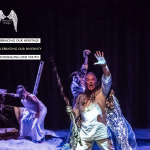Magnificent from the outset: I was gripped viscerally and imaginatively from the moment the thunderous music catapulted Lear’s savage kingdom onto the stage.
The last time I viewed a production of Shakespeare’s King Lear was in 2009 when Liverpool Everyman and the Young Vic co-produced the play, directed by Rupert Goold and starring Pete Postlethwaite. The images of the production that remain rest very much on Pete Postlethwaite’s portrayal of a frail old man who muddled through domestic arrangements with his adult children. While I loved the production, it would be true to say that I experienced Goold’s production as a kind ‘domestic’ rather than dynastic drama. The most powerful effect of the play on me was seeing Lear in the rain, brutalized by the knowledge of his loss of authority over even his own daughters.

Ricky Dukes’s interpretation of the play seems based on a totally different hypothesis: showing that in presenting Lear as a woman the themes of frailty and age could have always been intended by Shakespeare to be a mask covering up Lear’s savage rule, arising from a monarch’s arbitrary and unjust use of power. The strength of Jennifer Shakesby’s characterisation of Lear as an Amazonian warrior at the height of her powers is wonderful to watch. And it is made even more stunning through Rachel Dingle’s costuming of the character in a greatcoat of feathers and fur, which, later is stripped off as are her dignity and sanity. Lear is reduced to being a madwomen on the heath, walking barefooted & dressed down to a simple white petticoat. Her strength is only momentarily regained as she carries her dead child Cordelia through the heath-now-battlefield on which her daughters and their allies fight for control.
However, there is no escaping the fact that Lazarus Theatre’s Lear continues to be Shakespeare’s morality play on bad parenting: Duke shows, as other directors have done before him, that it is Lear’s parenting of three daughters through favouritism and her use of inconsistent sanctions and rewards that leads to her demise. And as other productions have shown, the Goneril and Regan are presented in the early part of the play as perfectly responsible to reject their parent’s riotous company. After all, what use does an out of work monarch have for 100 servants? Like in all tragedies, it follows then that Lear destruction is based on her own ‘fatal flaw’: a lack of insight and reason rules her life, crowded out by an hubris which cannot be mollified until it is ‘too late’.
Cast;
Lear – Jennifer Shakesby
Gonerill – Lucy Hagan-Walker
Regan – Alice Brown
Cordelia – Nellie McQuinn
Albany – Stephen MacNeice
Cornwall – Filip Krenus
Gloucester – Robin Holden
Edgar – Harper James
Edmund – Lewis Davidson
Kent – Danny Solomon
Burgundy – Stuart Mortimer
France – Mathew Foster
Oswald – Joseph Tweedale
Worcester – Dominic Attenborough
Nurse – Gemma Beaton
Julia – Jen Holt
Catherine – Elle Dillon-Reams
Creative;
Directed and Designed by Ricky Dukes
Original music by James Fogarty
Lighting Design by Rachel Smith
Sound Design by Nick Kent
Costume Design for Lear by Rachel Dingle
Associate Director – Gavin Harrington-Odedra
Assistant Director – Rebecca Hill
Production Manager – Ina Berggren
Stage Manager – Katie Lydon
Photography by Adam Trigg
Production Image by Will Beeston






